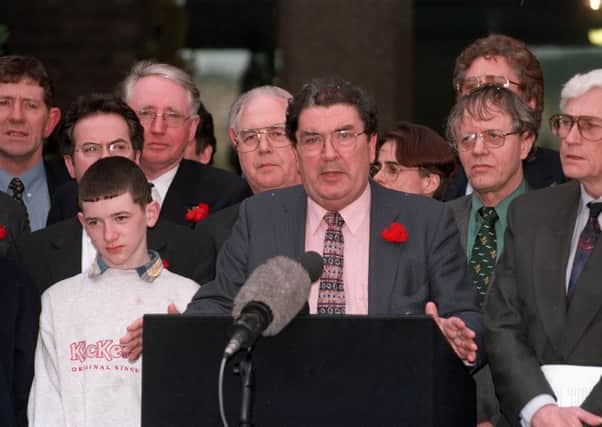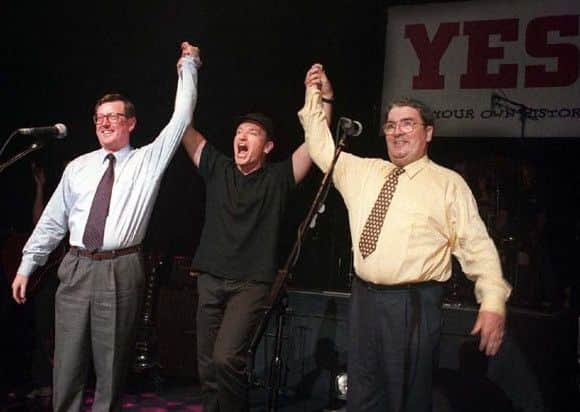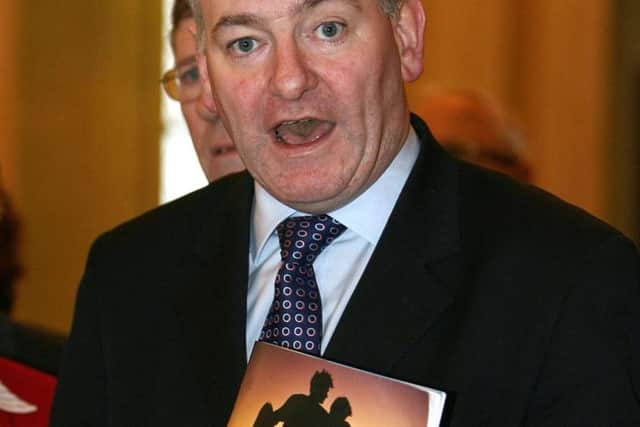1998 deal: Mark Durkan '“ '˜There was scepticism we would get a joint first minister office'


He wanted to know how we had managed to secure the Strand One outcome.
George was straight that he had not believed that we could get acceptance from the UUP, and others, of elective inclusion, ministers with executive powers, an actual executive committee and decision-making safeguards.
Advertisement
Hide AdAdvertisement
Hide AdAll of these had been resisted in various terms and he himself had counselled us to yield on some of these.


He had been bluntly sceptical about our chance of agreement on a joint first ministers’ office which we had only proposed in the final weeks of the talks.
Before we answered him, we asked if we could take from his fruit bowl which was then the last food in a hungry building.
We reminded him that in the previous days the UUP (and Alliance) had refused to meet us about Strand One until the Strand Two terms in the “Mitchell paper” were scaled down.
Advertisement
Hide AdAdvertisement
Hide AdThis was a real worry as we needed the Strand One terms strengthened. Even with everything in square brackets and italics that paper fell far short for us.


George repeated that the Strand Two text had not really been his with the Irish government insisting on a fully fixed text with no italics or square brackets.
We told him that Tony Blair had told us last night that he “deliberately allowed the Irish to over-negotiate that Strand Two text” knowing the negotiating dynamic would require concessions to the UUP.
This was a warning to us not to over-negotiate in Strand One as we resisted his attempts to get us to give up on some of our proposals before we were due to finally have bilaterals with the UUP now that they had signed off on Strand Two.
Advertisement
Hide AdAdvertisement
Hide Ad(The Irish government were stressing to us that our misgivings about the reduced text were obviated by the “backstop” of 31 October 1998 for having all three strands’ structures in place).


Our team had used the couple of days when the UUP wouldn’t meet us not just to keep talking to others but also to prepare a new “composite paper” on Strand One.
This comprised the full Mitchell text for Strand One (with brackets and italics) with variants and additions drafted by our “homework club”.
This extra text in different fonts reflected optional terms which we thought could suit other parties alongside our own priority terms.
Advertisement
Hide AdAdvertisement
Hide AdThe senator laughed when we told him that our composite paper was used as the working draft in the SDLP-UUP bilaterals the previous night.


He smiled further at the account of Seamus Mallon insinuating himself as the casual chair for most of those two key meetings as we went through the issues in sequence.
Paul Murphy (who chaired Strand One) had told him about getting a message from me not to put his head around the door of our bilateral around midnight (as previously arranged) to offer any help as this might disrupt a positive flow.
Part of the rationale we had offered the UUP for joint and equal first ministers was to provide assembly-mandated co-ordination among ministers if they still rejected an actual executive committee.
Advertisement
Hide AdAdvertisement
Hide AdDavid Trimble had told Seamus and me that our initial outline of twenty or so roles or requirements for the joint office was written too much in the language of functions rather than power.
So he had not rejected the concept.
We had redrawn the terms in our composite paper away from a functional list but any power rested on the assembly being the primary source of devolved authority.
Their repeated concerns about rogue ministers informed how we drafted the roles of assembly committees and possibly added to their eventual concession that their own proposals lacked in terms of coordinated governance and strategic policies.
Like Tony Blair, George Mitchell was surprised that the UUP had agreed to some of the cross-community safeguards but we explained that these were also reassurances for their concerns about over-powerful ministers doing partisan solo runs.
Advertisement
Hide AdAdvertisement
Hide AdThe terms for removal or exclusion from ministerial office were among the more pointedly negotiated points between us. While the agreed text included the Mitchell Principles, we refused any direct specific on decommissioning which was to be overseen by the IICD in a timeframe still to be confirmed.
When George observed that we had negotiated more successfully than he had thought possible, Seamus teasingly invited him to stay to the “backstop” of 31 October.
The predictable response was “ I’m out of here!”. We shared our concern that a line in the decommissioning text cross-referencing the ministerial exclusion provisions in Strand One could slip into a new “pub-crawl of preconditions” which might see the “backstop” shrivel.
The fact that the Irish government had tried to reassure us by saying that they had drafted that very wording was no real comfort that this would no twist.
Advertisement
Hide AdAdvertisement
Hide AdGeorge mentioned the clear timelines in respect of the institutions being up and running by October end, decommissioning by May 2000 and prison releases by June 2000.
He acknowledged that implementation would be a whole new political challenge. As he looked at the clock on his wall, he told us that in his experience “a lot of time in politics is waiting around” so we would probably experience a lot more of this.
John Hume had joined us by now asking if a deadline might help but also wondering if it might help if parties talked about how to work the referendum. He was also disappointed to find the fruit was finished.
Apologising for the lack of fruit, George clearly pointed to us as culprits before giving his profound personal acknowledgement to John.
Advertisement
Hide AdAdvertisement
Hide AdIn our own rooms later we heard about a letter of comfort for David Trimble from Tony Blair. Seamus alluded to our “backstop” doubts and misgivings about the Irish government’s text enabling a negative linkage between ministerial office and decommissioning.
He told John and us that he could see problems stemming from all of this.
The subsequent problems over interpretation, implementation, capricious adherence and the lax authority shown by the government co-guarantors may have proved his foreboding right. But, more importantly, our positive reasons for shaping and supporting the agreement have also been proed right.
A renewal review to restore parts of the agreement to original factory settings instead of the St Andrews changes could remedy some of the issues underlying the limbo-locked embarrassment of wireless “bluetooth” rule from Westminster.
Advertisement
Hide AdAdvertisement
Hide AdIt could also reboot the hugely under-used bandwidth of Strands Two and Three as future-proofed channels for alignment to answer many of the problems that Brexit poses.
• Mr Durkan became deputy first minister in 2001